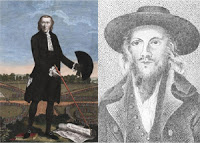As few members of the British
aristocracy have converted to Judaism, the conversion of Lord George Gordon*
(1751 – 1793) was a matter of note in British society.
aristocracy have converted to Judaism, the conversion of Lord George Gordon*
(1751 – 1793) was a matter of note in British society.
Lord George’s life both before
and after his conversion was a roller coaster of events. At 12, he sailed as a
midshipman (officer-in-training) to Jamaica. After his service in the Carribean
and earning the rank of Lieutenant, he spent time in Virginia, where he
developed a great sympathy for the colonists’ desire for self-rule.
and after his conversion was a roller coaster of events. At 12, he sailed as a
midshipman (officer-in-training) to Jamaica. After his service in the Carribean
and earning the rank of Lieutenant, he spent time in Virginia, where he
developed a great sympathy for the colonists’ desire for self-rule.
In 1774, Lord George attained
a seat in the House of Commons. In 1779, he organized and presided over the
Protestant Assembly, an organization opposed to a bill that would relax the
restriction on Catholic rights that was designed, in his opinion, to woo the
Catholic nations to support England’s war against the Colonies. Unfortunately,
when a rally to petition the repeal of the bill turned violent (Gordon
Riots), Lord George was blamed and imprisoned in the Tower of London.
Ultimately, he was acquitted.
a seat in the House of Commons. In 1779, he organized and presided over the
Protestant Assembly, an organization opposed to a bill that would relax the
restriction on Catholic rights that was designed, in his opinion, to woo the
Catholic nations to support England’s war against the Colonies. Unfortunately,
when a rally to petition the repeal of the bill turned violent (Gordon
Riots), Lord George was blamed and imprisoned in the Tower of London.
Ultimately, he was acquitted.
Once free, Lord George retired
from public life. When he began his friendship with the local Jewish community,
his requests to convert to Judaism were rejected by London’s Chief Rabbi
(perhaps to protect the local community from an unpopular public figure).
from public life. When he began his friendship with the local Jewish community,
his requests to convert to Judaism were rejected by London’s Chief Rabbi
(perhaps to protect the local community from an unpopular public figure).
In 1787, Lord George was
charged and convicted of defamation (in support of a friend, he had
taken a newspaper ad denouncing Marie Antoinette). He fled the
court and took up residence in the Jewish community in Birmingham, where he
formally converted. He spent six months living as Israel ben Abraham before
being arrested and then the final six years of his life in the infamous Newgate
prison. His brother, the Duke, arranged a private quarter, as well as kosher
food. As a wealthy prisoner, he was also allowed visitors and even managed to
have a minyan in his cell each Shabbat. He frequently visited the other
prisoners and distributed charity among them.
charged and convicted of defamation (in support of a friend, he had
taken a newspaper ad denouncing Marie Antoinette). He fled the
court and took up residence in the Jewish community in Birmingham, where he
formally converted. He spent six months living as Israel ben Abraham before
being arrested and then the final six years of his life in the infamous Newgate
prison. His brother, the Duke, arranged a private quarter, as well as kosher
food. As a wealthy prisoner, he was also allowed visitors and even managed to
have a minyan in his cell each Shabbat. He frequently visited the other
prisoners and distributed charity among them.

At the end of his 5 year
sentence, Lord George was returned to prison when he refused to allow non-Jews
(even his brothers) to guarantee his future good behavior (and the court refused
to recognize his two Jewish guarantors). On November 1, 1793, Lord George
perished from a prison typhoid outbreak.
sentence, Lord George was returned to prison when he refused to allow non-Jews
(even his brothers) to guarantee his future good behavior (and the court refused
to recognize his two Jewish guarantors). On November 1, 1793, Lord George
perished from a prison typhoid outbreak.
(Not to be confused with the
poet Lord George Gordon Byron.)
poet Lord George Gordon Byron.)
Copyright © 2012 National Jewish Outreach Program. All rights reserved.
If you like what you’ve read here, signup to get notifications about new treats.
 Print This Page
Print This Page